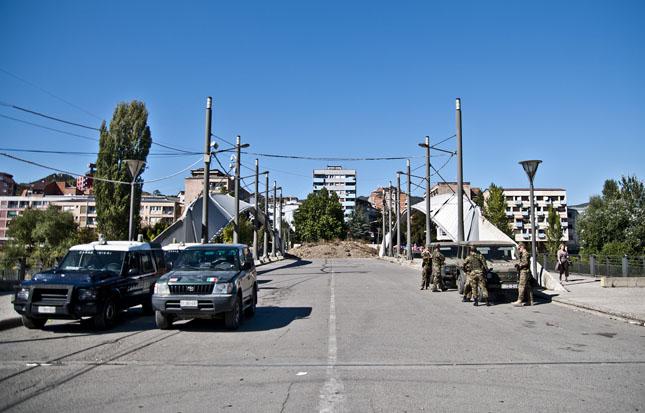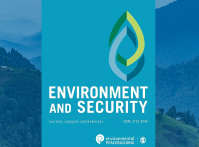-
In Kosovo, Post-War Water Faults Show Challenge of Balancing Political With Technical
September 1, 2016 By Florian Krampe
Rivers have shaped the Western Balkan Peninsula’s characteristic landscape and played an important role in its history. Following the violence of the Yugoslav secession wars in the 1990s and the creation of six new nations, the number of transboundary river basins doubled from 6 to 13. In Kosovo, where independence remains a question, the water sector is a microcosm of tensions between ethnic Serbs and Albanians. The challenge of water resource management exists not only over the province’s contested national boundaries with Serbia, but between divided ethnic groups within the territory.
In recent research published in Cooperation and Conflict, I show how the international community, choosing a highly technical approach to reconstruction of the Kosovo water sector after the conclusion of violence, has frequently clashed with political realities in this landlocked and disputed territory. The United Nations Interim Administration in Kosovo (UNMIK), which assumed trusteeship of the territory in 1999 until it was replaced by a European Union mission in 2008, was caught in continuous tension between technical ideals and the limits of what politics would allow. Empirical analysis shows UNMIK’s handling of the water sector in fact impeded the peace process.
A Divided City
The New Bridge in the ethnically divided city of Mitrovica has been a symbol of continuous conflict between parties since a fragile peace was established in Kosovo in 1999. It serves as the main crossing over the river Ibar, but has become a de facto frontier, dividing the city into an Albanian-dominated south and a Serb-dominated north. Questions about the future of the territory have sparked confrontation between the two groups, often facing off on the bridge, throughout the years.
Adding to the tense ethnic situation, Mitrovica’s water supply comes from the Gazivoda reservoir at the Serb border. The reservoir’s tributaries are in Serbian territory and the reservoir itself is partially located within Serbia. The system that supplies water from the reservoir to the water treatment plant in Mitrovica is operated by Serbs and managed and financed through Belgrade.
UNMIK, as the political authority, sought to avoid confrontationPrior to the 1998-1999 conflict, the entire water supply for Mitrovica was managed by one company. Afterward, the company split into two. One company controlled the water supply for the Serbian-dominated northern part of the city and a second managed the water supply for Albanian-dominated south, including the city’s only water treatment plant. This means that water to the city is provided from a Serbian-controlled reservoir, enters an Albanian-controlled treatment plant, and then is pumped back out to both northern and southern parts of the city. The Serbian company does not collect fees from water users in the north, but nor does it provide payment to the treatment plant, much to the south’s chagrin.
Both UNMIK and the Kosovo Trust Agency (KTA), an independent public body established in 2002 to facilitate economic liberalization of formally socially and publicly owned enterprises, envisioned that the northern supply network, water company, and its staff would be integrated into a new regional structure of water companies. UNMIK hoped that this would reduce tensions between the north and south; allow infrastructure investment in the north through international donors; and improve the operational performance of the highly overstaffed northern company.
But offers to pay the salaries of staff and integrate the company by registering it in Pristina failed as UNMIK underestimated the collective identity of the Serbs. Serb staff saw themselves as part of Serbia and therefore would not cooperate with Kosovar authorities. This position was further facilitated by Belgrade, as the government paid the wages of public servants in the Serb areas of Kosovo.
Cooperation between UNMIK and the Albanian-run water company in Mitrovica was comparatively easy as UNMIK was seen as the liberator from Serb oppression. Yet, staff was quite agitated and unhappy that they supplied water for free to the northern company. KTA with its market-oriented mandate to increase the effectiveness of the water sector was generally in favor of a stricter response to outstanding payments. Conversely, UNMIK, as the political authority, sought to avoid any confrontation over the issue. This in turn meant that UNMIK had to pay higher and higher subsidies to the southern water company to cover its extensive monetary losses (up to €500,000 annually). This measure, and the control of KTA staff on the boards of the water companies, may have reduced the anger of Albanian Kosovars to the extent that no conflictive action was taken, yet tensions persisted and grievances were left unaddressed.
The complex interdependence between northern and southern Mitrovica forced both sides to communicate to at least a limited degree. The Organization for Security and Cooperation in Europe concluded in 2008 that coordination was ensuring supply, but “there is a lack of actual cooperation among the actors involved in water supply issues.”
UNMIK attempted at some point to increase communication between the north and south by holding technical meetings for the utility sector which they were attempting to consolidate. Serb water authorities attended the monthly meetings, yet those from Mitrovica were not enthusiastic towards cooperation and overall the north refused to restructure their water companies into a new regional framework. In 2005, the KTA and Gerard M. Gallucci, the UN regional representative in Mitrovica, initiated another monthly technical dialogue to bring Albanian and Serb water actors together. Despite several meetings, the initiative failed as neither side were committed to cooperation, and on a technical level there was not much that could be done to redress the ethnic division.
When Functional Is Not Good Enough
The process of water management in Kosovo illustrates a serious break between the technical aspects of water resource management and its political implementation during a post-conflict reconstruction phase. UNMIK was very aware of the ethnic tensions between Serbs and Albanians, particularly in regard to the water sector. Nonetheless there was no strategy to deal with the issue. Consumed by a functionalist mindset, their strategy was geared toward reconstruction, structural adjustment, and improving operational performance. In the absence of any political strategy, the approach led to a situation whereby UNMIK facilitated the separation of actors instead of bringing them closer together while consolidating a parallel water governance and infrastructure system in Serb-dominated areas.
Water strategies need to be sensitive to political contexts to foster social integration in deeply divided societiesContact is essential to facilitate cooperation. The unwillingness of northern companies to coordinate and UNMIK’s inability to enable contact meant that cooperation among Serbs and Albanians was not feasible from the start. This compromised the possibility of building trust in the long run, and indeed led to a corrosion as grievances accumulated.
KTA staff across several sectors advised UNMIK to be more forceful in implementing reforms, such as by consolidating and regionalizing water companies throughout the territory, especially in the north. Instead of using the reforms to facilitate contact, however, UNMIK accepted the non-participation of Serbs and allowed for separate water resource management governance structures and infrastructure to continue. In effect, this consolidated ethnic divisions.
You are always smarter in hindsight. Unquestionably, the situation in Kosovo in 1999 was a tremendous challenge for the United Nations, OSCE, European Union, and those involved in the reconstruction effort. From a technical perspective, water resource management efforts in Kosovo were successful. In most instances, UNMIK and the KTA managed to reconstruct and reform the water sector. In addition, water resource management efforts did not incite direct violence or a deterioration in the security situation, despite the high level of ethnic tension between Serbs and Albanians.
Yet, the case provides scholars and practitioners important insight into post-conflict water resource reforms in how they fell flat. The complex and important political dimensions of water resource management during reconstruction cannot be ignored and require new strategies. These strategies need to not only be sensitive to ecological contexts, but local political contexts to foster social integration and long-term peace in deeply divided societies. To achieve sustainable peace, we must better acknowledge and understand the linkages between such social, political, and ecological processes.
For references and more detail see “Water for Peace? Post-Conflict Water Resource Management in Kosovo,” in Cooperation and Conflict.
Florian Krampe is a political scientist specializing in peace and conflict research, international relations, and political ecology at the Department of Peace and Conflict Research at Uppsala University. He currently works on peacebuilding, the social and political impacts of climate change, water security and governance, as well as environmental peacebuilding.
Sources: Cooperation and Conflict, Organization for Security and Cooperation in Europe.
Photo Credit: The New Bridge in Mitrovica, courtesy of flickr user Marco Fieber.
 A Publication of the Stimson Center.
A Publication of the Stimson Center.






